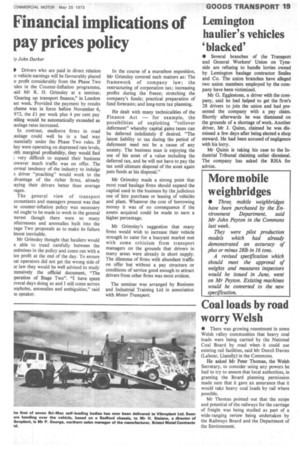Financial implications of pay prices policy
Page 21

If you've noticed an error in this article please click here to report it so we can fix it.
iy John Darker III Drivers who are paid in direct relation
o vehicle earnings will be favourably placed
o profit considerably from the Phase Two vies in the Counter-Inflation programme, ;aid Mi. R. H. Grimsley at a seminar, 'Gearing up transport finance," in London ast week. Provided the payment by results cheme was in force before November 6, 972, the £1 per week plus 4 per cent pay tiling would be automatically exceeded as iaulage rates increased.
In contrast, mediocre firms in road taulage could well be in a bad way inancially under the Phase Two rules. If hey were operating on depressed rate levels, vith marginal profitability, they would find t very difficult to expand their business iowever much traffic was on offer. The iormal tendency of the industry to indulge a driver "poaching" would work to the .dvantage of the richer firms., already Qying their drivers better than average vages.
The general view of transport ccountants and managers present was that he counter-inflation policy was necessary nd ought to be made to work in the general aterest though there were so many nfairnesses and anomalies built into the tage Two proposals as to make its failure lmost inevitable.
Mr Grimsley thought that hauliers would e able to tread carefully between the mdmines in the policy and come out with a ice profit at the end of the day. To ensure lax operators did not get the wrong side of ie law they would be well advised to study atensively the official document, "The iperation of Stage Two". "I have spent everal days doing so and I still come across )opholes, anomalies and ambiguities," said le speaker. In the course of a marathon exposition, Mr Grimsley covered such matters as: The framework of company law; the restructuring of corporation tax; increasing profits during the freeze; stretching the company's funds; practical preparation of fund forecasts; and long-term tax planning.
He dealt with many technicalities of the Finance Act — for example, the possibilities of exploiting "rollover deferment" whereby capital gains taxes can be deferred indefinitely if desired. "The latent liability to tax during the period of deferment need not be a cause of any anxiety. The business man is enjoying the use of his asset of a value including the deferred tax, and he will not have to pay the tax until ultimate disposal of the asset again puts funds at his disposal."
Mr Grimsley made a strong point that most road haulage firms should expand the capital used in the business by the judicious use of hire purchase or leasing of vehicles and plant. Whatever the cost of borrowing money it was of no consequence if the assets acquired could be made to earn a higher percentage.
Mr Grimsley's suggestion that many firms would wish to increase their vehicle strength to cater for a buoyant market met with some criticism from transport managers on the grounds that drivers in many areas were already in short supply. The dilemma of firms with abundant traffic on offer but without a pay structure or conditions of service good enough to attract drivers from other firms was most evident.
The seminar was arranged by Business and Industrial Training Ltd in association with Motor Transport.
























































































































































